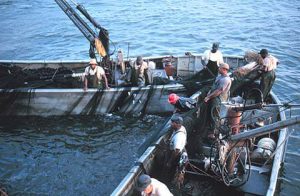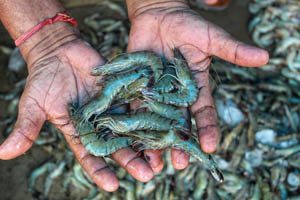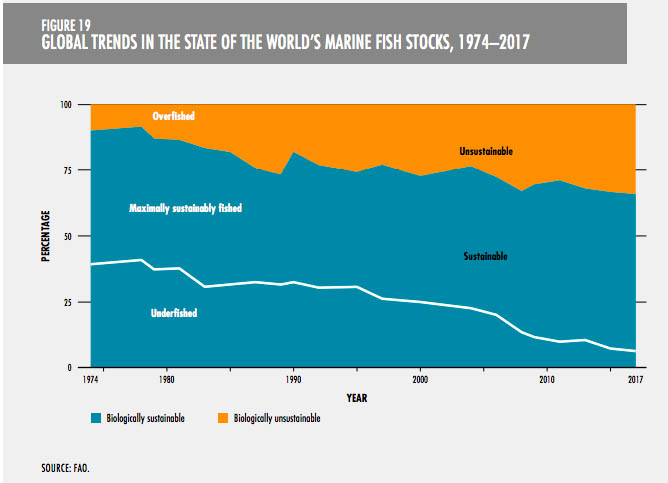Sustainability and Fish
Looking out over seemingly infinite stretches of ocean rolling in waves from faraway horizons, we may find ourselves surprised that what the ocean can provide is, indeed, finite. There is a point at which we extract much faster than marine life recovers, a rate at which our demand is much too relentless for life to flourish. We have reached that point: the percent of fish stocks fished at sustainable levels has steadily declined over the past 50 years. And the margin for responsible fishing is narrowing as climate change decreases the amount of seafood that humans can sustainably harvest. Global fish decline, while daunting, is not unalterable. Fisheries management has been proved effective in restoring and rebuilding fish stocks above target levels. We have seen the efficacy of fisheries management in the United States, where, as a result of the Magnuson-Stevens Act, the number of overfished stocks hit a record low in 2017. Fisheries are declining not only because of overfishing but also because of climate change. As ocean temperatures rise, many species are shifting towards warmer waters, placing undue stress on small scale fishermen. In North Carolina, fishermen are witnessing their fish move North. If the Paris Agreement is followed and warming is limited to 1.5 degrees Celsius, global fisheries could generate additional billions in revenue. Action now is also critical to global food security, for fisheries provide 3.3 billion people with a substantial portion of their dietary protein. Individuals may ask themselves how they can eat seafood more sustainably. Groups such as Greenpeace and Monterey Bay Aquarium have created consumer guides on sustainable seafood. Generally, buying local seafood is a sustainable option because United States fisheries are well-regulated, and local options do not have to travel as far. Still, consumerism does not excuse industry inaction. The work must go deeper. For this reason, RCC supports sustainability and fish through advocacy for climate action, science-based fisheries policy, and protection of marine habitats that fish depend upon. Now, North Carolina fishers must take their boats on extended journeys to New Jersey and Maryland to capture the same species. Clearly, fisheries management alone cannot stem global fish decline. Management must work in tandem with climate change action.
Now, North Carolina fishers must take their boats on extended journeys to New Jersey and Maryland to capture the same species. Clearly, fisheries management alone cannot stem global fish decline. Management must work in tandem with climate change action. Of course, evaluating the incredible variety of marine life according to its utility further detaches us from the mysterious world of fish, reducing fish to a commodity. This is the case for the endangered bluefin tuna, a species for which the catch quota has been increased despite the fact that its populations are heavily exploited and not fully recovered. Rachel Carson, who wrote in awe of the fascinating life cycle and migration of mackerel from shallow coastal waters to the luminescent depths of the open ocean, expressed empathy with creatures of the sea.
Of course, evaluating the incredible variety of marine life according to its utility further detaches us from the mysterious world of fish, reducing fish to a commodity. This is the case for the endangered bluefin tuna, a species for which the catch quota has been increased despite the fact that its populations are heavily exploited and not fully recovered. Rachel Carson, who wrote in awe of the fascinating life cycle and migration of mackerel from shallow coastal waters to the luminescent depths of the open ocean, expressed empathy with creatures of the sea.
The Shrimp on Your Table Has a Dark History A few months ago, along the coast of Andhra Pradesh in eastern India, Josh Farinella drove 40 minutes out of his way to visit workers who peel shrimp for Choice Canning, where he worked as a shrimp factory manager. He didn’t travel to the rural area for any of his job responsibilities; he was there to document injustice. He observed a crew of local women quickly peeling shrimp along rusty tables in 90-degree heat, wearing street clothes and flip-flops. Read more Nothing Fishy Here. Potomac River Shad Are Making a Comeback! The Potomac River has seen a big improvement in water quality thanks to numerous cleanup efforts. In fact, Potomac Conservancy assessed over 20 ecosystem health indicators and graded the river a “B” in 2023. Back in 2010, the Potomac River scored an abysmal “D.” Read more Sign up here to receive the monthly RCC Coasts and Ocean Observer and other RCC newsletters, information and alerts. Click here for past issues of the RCC Coasts and Ocean Observer Click here for Previous Sustainability and Fish NewsLatest News About Sustainability and Fish
 In this week’s Field Report, shining a light on India’s exploited shrimp workers, the spread of avian flu, and the big banks undermining climate goals.
In this week’s Field Report, shining a light on India’s exploited shrimp workers, the spread of avian flu, and the big banks undermining climate goals.
 Two local anglers weigh in why restoration efforts are making a difference.
Two local anglers weigh in why restoration efforts are making a difference.
![]()








